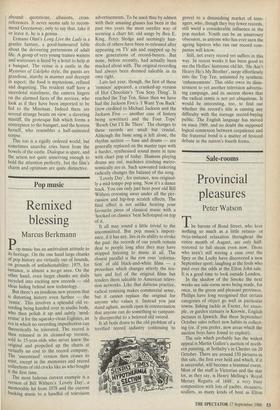Pop music
Remixed blessing
Marcus Berkmann
Pop music has an ambivalent attitude to its heritage. On the one hand large chunks of pop history are virtually out of bounds, on grounds of unfashionability: 1975, for instance, is almost a no-go area. On the other hand, even larger chunks are daily recycled into exciting new records — old ideas hiding behind new technology.
But there's an insidious new process that is distorting history even further — the remix'. This involves a splendid old re- cording being handed over to studio bods, who then polish it up and subtly 'mod- ernise' it for the squeaky-clean Eighties, an era in which no recording imperfection can theoretically be tolerated. The record is then reissued in its cleaned-up version, sold to 15-year-olds who never knew the original and propelled up the charts at virtually no cost to the record company. The `unremixed' version then ceases to exist, except in the memories and record collections of old crocks like us who bought It the first time.
The most hideous current example is a version of Bill Withers's 'Lovely Day', a memorable hit from 1978 and the current backing music to a handful of television advertisements. To be used thus by admen with their amusing glasses has been in the past two years the most surefire way of securing a chart hit: old songs by Ben E. King, Percy Sledge and seemingly hun- dreds of others have been re-released after appearing on TV ads and snapped up by new generations of record-buyers. But none, before recently, had actually been mucked about with. The original recording had always been deemed saleable in its own right.
Late last year, though, the first of these `remixes' appeared, a cranked-up version of Hot Chocolate's 'You Sexy Thing'. It reached the Top Ten. Since then we have had the Jackson Five's 'I Want You Back' (now credited to Michael Jackson and the Jackson Five — another case of history being rewritten) and the Four Tops' `Reach Out I'll Be There'. The changes to these records are small but crucial. Although the basic song is left alone, the rhythm section — bass and drums — are generally replaced on the master tape with a harder, synthesised sound more in tune with chart pop of today. Humans playing drums are out, machines crashing metro- nomically are in. Such unwonted tinkering radically changes the balance of the song.
`Lovely Day', for instance, was original- ly a mid-tempo pop song. Now it's a dance track. You can only just hear poor old Bill Withers crooning away under all the per- cussion and hip-hop scratch effects. The final effect is not unlike hearing your favourite piece of classical music with a `hooked on classics' beat Sellotaped on top of it.
It all may sound a little trivial to the uncommitted. But pop music's import- ance, if it has any, lies in its ability to evoke the past: the records of our youth remain dear to people long after they may have stopped listening to music at all. The closest parallel is the row over `colorisa- tion' of old black-and-white films — a procedure which changes utterly the tex- ture and feel of the original films but renders them saleable to American televi- sion networks. Like that dubious practice, radical remixing makes commercial sense, but it cannot replace the original for anyone who values it. Instead you just stand aghast, mouth open in consternation that anyone can do something so rampant- ly disrepectful to a beloved old record. It all boils down to the old problem of a terrified record industry continuing to grovel to a diminishing market of teen- agers, who, though they buy fewer records, still wield a considerable influence in the pop market. • Youth can be an unsavoury obsession, as anyone who has ever seen the ageing hipsters who run our record com- panies will know.
Still, not every record yet suffers in this way. In recent weeks it has been good to see the Hollies' histrionic old hit, 'He Ain't Heavy He's My Brother', surge effortlessly into the Top Ten, untainted by synthetic `enhancements'. This oldie owes its disin- terment to yet another television advertis- ing campaign, and its success shows that the radical remix is not yet ubiquitous. It would be interesting, too, to find out whether the record's title is causing any difficulty with the teenage record-buying public. The English language has moved on since 1969, and no doubt the supposed logical connexion between corpulence and the fraternal bond is a matter of fevered debate in the nation's fourth forms.


































































 Previous page
Previous page